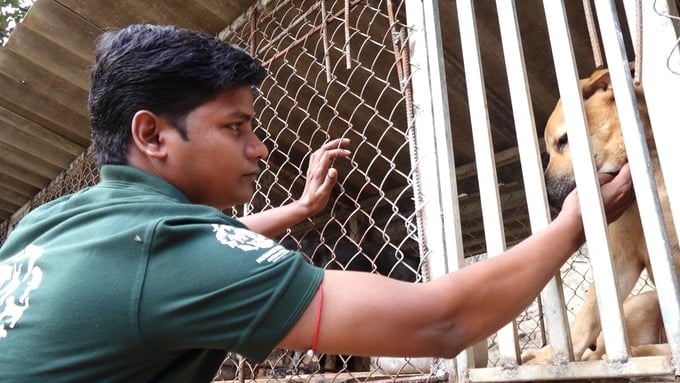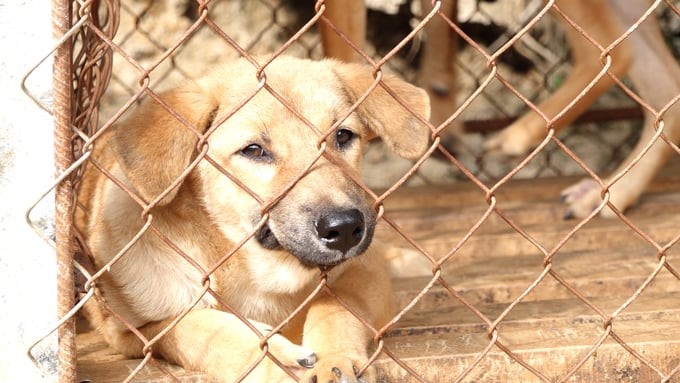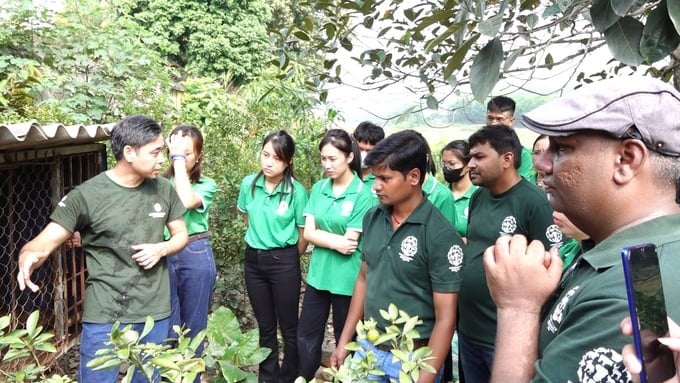June 19, 2025 | 07:25 GMT +7
June 19, 2025 | 07:25 GMT +7
Hotline: 0913.378.918
June 19, 2025 | 07:25 GMT +7
Hotline: 0913.378.918

HSI's rescue team approached a dog individual at Mr. Hung's house. Photo: Quang Linh.
Advancing the welfare of animals in more than 50 countries, Humane Society International works around the globe to promote the human-animal bond, rescue and protect dogs and cats, improve farm animal welfare, protect wildlife, promote animal-free testing and research, respond to disasters and confront cruelty to animals in all of its forms.
44 dogs (6 10-day-old puppies and 2 pregnant dogs) were just rescued from a dog fattening and slaughter facility in Cay Xanh hamlet, Quyet Thang commune, Thai Nguyen city, after Mr. Kieu Viet Hung, owner of the slaughterhouse, decided to close his facility for humanitarian purposes and to prevent the spread of rabies in the community.
After stopping business, Mr. Hung received help from the "Models for Change" program of the Humane Society International (HSI) Organization to convert his livelihood into a form of agricultural business serving the community in the locality.
HSI's rescue team, including members from Vietnam, Indonesia, and India, transferred 44 dog individuals from the slaughterhouse to the Animal Rescue Center at the Thai Nguyen University of Agriculture and Forestry. All individuals are vaccinated and receive medical care and rehabilitation before being considered for local adoption.
Most of the 44 above-mentioned dogs were bought from families in the surrounding area who raised them at home to increase their income. Traders often travel through each hamlet on motorbikes or trucks to collect puppies from local people. The puppies are impounded in small cages and transported for many hours to facilities like Mr. Hung's facility for fattening.

The individual dog is about to be rescued at the slaughterhouse. Photo: Quang Linh.
Mr. Hung said: "When learning about HSI's "Models for Change" program that helped another slaughterhouse owner in Thai Nguyen close the facility and change the business model last year, I was very happy to know I could start over without having to kill dogs for a living. I am very joyful with the new start of my business and believe that all my dogs will have happier lives and be adopted by kind owners.”
Ms. Tham Hong Phuong, Country Director of HSI in Vietnam, shared: "Dog meat trading is a dangerous form of business in Vietnam, affecting and threatening the health of the entire population. Mr. Hung is the second person in Vietnam to participate in our Models for Change."
HSI's Country Director hopes this program will be a driving force for authorities to come up with a specific action plan to provide a sustainable livelihood transformation model for dog slaughterers and, at the same time, support the work of rabies prevention.
HSI deployed the "Models for Change" program in Vietnam in 2022 through the closure of a slaughterhouse and dog meat restaurant owned by a neighbor of Mr. Hung. This closure inspired Mr. Hung to contact the Thai Nguyen University of Agriculture and Forestry to ask for help in taking care of the dogs.

Students of the Faculty of Animal Science and Veterinary Medicine (Thai Nguyen University of Agriculture and Forestry) experience and practice animal rescue and care skills. Photo: Quang Linh.
Ms. Phan Thi Hong Phuc, Head of the Faculty of Animal Science and Veterinary Medicine (Thai Nguyen University of Agriculture and Forestry), commented that dogs of unknown origin have a high risk of contracting rabies, infecting humans through just a small scratch during the slaughter process, especially with individuals not vaccinated against rabies.
"Slaughterhouses buy dogs in many places to self-slaughter. This action increases the risk of infection and the difficulty in controlling rabies by many times. Rabies, if not given proper attention, will have bad consequences for human health. Therefore, the Faculty of Animal Science and Veterinary Medicine is very active in communication work and rescuing individual dogs from the slaughterhouse," Ms. Phuc said.
There have been some cases of dogs positive for rabies recorded at dog meat processing facilities in Hanoi, whether they are traded from neighboring countries, captured and transported to Vietnam, or sold to slaughter facilities of local households.
The dog meat trade from slaughter without known disease status or vaccination poses a threat to authorities' efforts to control the spread of the rabies virus.
Rabies causes the deaths of more than 70 people each year in Vietnam. According to the World Health Organization, most are cases bitten by dogs, as well as cases that were verified to involve the killing and consumption of dogs.
Translated by Huyen Vu Thu

(VAN) To address plastic pollution, closing the plastic recycling cycle will bring significant economic and environmental benefits.

(VAN) According to the Binh Thuan Department of Industry and Trade, in the first five months of 2025, Binh Thuan's dragon fruit export turnover increased by 20.65% compared to the same period last year.

(VAN) EU countries on Thursday gave final approval to new tariffs on fertilizer imports from Russia, a move aimed at cutting off revenue that could support Moscow’s war in Ukraine, despite concerns from European farmers.

(VAN) The working delegation from the Ministry of Agriculture and Environment conducted an important trip to the Netherlands to strengthen strategic partnerships and sustainable development in the agricultural sector.

(VAN) The letter ‘A Plea from the Ocean’ not only evokes emotion but also awakens the human conscience to the responsibility of protecting life on Earth.

(VAN) The Department of Agriculture in South Africa has announced the country’s first mass vaccination of poultry to prevent local birds from contracting avian influenza.

(VAN) Establishment of the Mekong Delta Regional Agricultural Linkage Center, aiming for a closed value chain, deep processing, trading platforms, and international market connectivity.